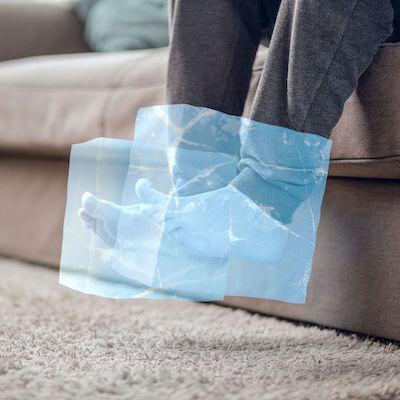
Your feet are at the furthest tip of your circulatory system, which has the all-important job of bringing oxygen, white blood cells that fight disease, and other essentials all over your body. Your circulatory system, which includes your heart and blood vessels, can be compared to a complex highway system comprised of nearly 60,000 miles of blood vessels!
The importance of good circulation cannot be overstated. Your body thrives when your blood is flowing well. It can regulate temperature, fight illness, recover from injury, and push through tough physical strain. This is a system that supports crucial bodily functions and contributes to your overall wellbeing.
Do I have poor circulation?
Since your feet are further from your heart than the rest of your body, they can be the most difficult to pump blood to and from. Therefore, that is why they’re the most prone to poor circulation. Here are some signs you might be dealing with this issue:
●Constant coldness
●Tingling, burning, throbbing, stinging sensations in the feet
●Numbness
●Red, blue, or purple toes
●Cracked heels
●Dry skin on your feet
●Wounds slow to heal
●Hair loss on legs
●Muscle cramps, stiffness, or weakness
●Swelling
●Pain in the feet and ankles
If left untreated, poor circulation can lead to serious issues like nerve or tissue damage. It could even lead to Deep Vein Thrombosis, a life-threatening condition that can require urgent medical assistance.
What can cause poor circulation?
If you are one of our diabetic patients, you are vulnerable to developing poor circulation as high glucose levels can damage blood vessels and slow down circulation. This is one of the main reasons, we encourage our diabetic patients to schedule regular diabetic foot assessments.
Smoking is another common risk factor. Nicotine thickens the blood and constricts blood vessels, which can cause major circulation issues.
A high-fat diet can clog up blood vessels, while dehydration can slow circulation down. As we age, our circulatory system also naturally works less effectively.
Diagnosis and treatment
Poor circulation often indicates an underlying health issue, which is why it’s important to get it checked out immediately. To assess your circulation, your foot doctor will likely do a Doppler test. This ultrasound scan will check for vascular issues in your feet and legs, measuring blood flow and helping to detect constricted, damaged, or blocked vessels.
If your doctor diagnoses you with poor circulation, they will talk through a treatment plan with you that tackles the root cause of the issue. The plan could include medication, circulation-boosting exercises, compression socks, lifestyle changes, or more.
Worried you have poor circulation? Don’t hesitate to get in touch with our team of dedicated podiatrists at Kentucky/Indiana Foot and Ankle Specialists. Our foot doctors will provide highly individualized, advanced treatments so you can feel your best! Contact us at 502-805-3338 to schedule an appointment at any of our locations in Louisville, Elizabethtown, Bardstown, Bowling Green, KY and New Albany, IN.
